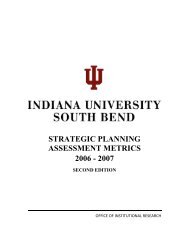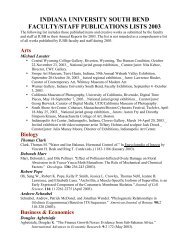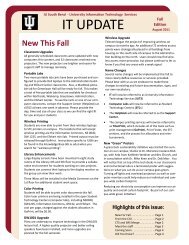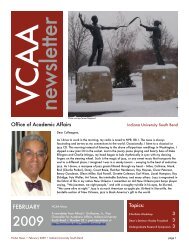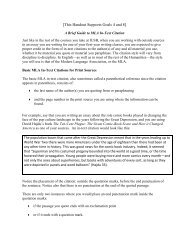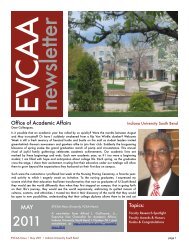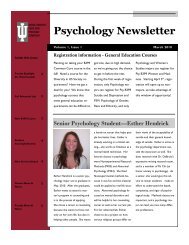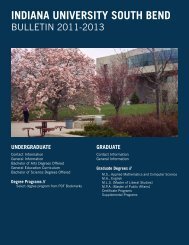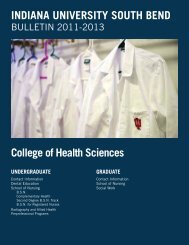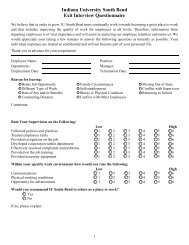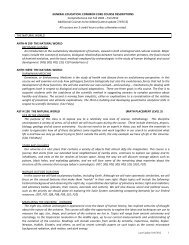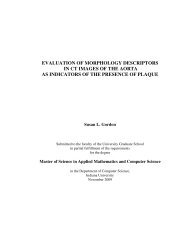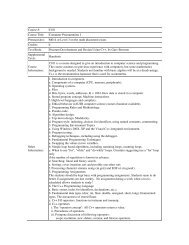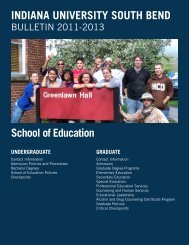Current version - Indiana University South Bend
Current version - Indiana University South Bend
Current version - Indiana University South Bend
Create successful ePaper yourself
Turn your PDF publications into a flip-book with our unique Google optimized e-Paper software.
2503 GRADUATE DEGREES3 SCHOOL OF EDUCATION<br />
advising sheet and/or consult their advisor for current<br />
field requirements for their program of study.<br />
• Focus in secondary education<br />
• Focus in secondary education with initial certification<br />
• Focus in secondary education with reading licensure<br />
• Secondary education with K-12 licensure in educational<br />
leadership<br />
• Secondary education with English as a new language licensure<br />
Required field experience for Special<br />
Education<br />
Graduate students in special education who are working<br />
on their initial teaching license or an additional license<br />
will typically complete field experiences in specific<br />
placements. If approved, these placements may be in the<br />
classroom where they are employed. Students should<br />
refer to the advising sheet, consult their advisor, and<br />
meet with the director of clinical and field experiences<br />
for current field requirements for their program of study.<br />
• Mild interventions<br />
• Intense interventions<br />
Required field experience for Counseling<br />
and Human Services<br />
Counseling students complete practica and internships<br />
that meet CACREP accreditation standards. Students<br />
should refer to the advising sheet and/or consult with<br />
the program coordinator and their advisor for current<br />
requirements.<br />
• Alcohol and substance abuse<br />
• Clinical mental health counseling<br />
• School counseling<br />
ACCREDITATION<br />
The School of Education was granted continuing<br />
accreditation by the National Council for the Accreditation<br />
of Teacher Education (NCATE) and the <strong>Indiana</strong><br />
Department of Education Division of Professional<br />
Standards through 2012. The School of Education met<br />
all NCATE standards for initial and advanced programs.<br />
The Counseling and Human Services degree program<br />
has received national accreditation by the Council for<br />
Accreditation of Counseling and Related Educational<br />
Programs (CACREP).<br />
Conceptual Framework<br />
The members of the faculty and staff in the School of<br />
Education have a commitment to preparing educators<br />
who assume leadership responsibilities in and beyond<br />
the classroom. In our advanced programs, teachers,<br />
counselors, and principals build on classroom leadership<br />
responsibilities to become advocates, decision makers,<br />
researchers, and partners in school and community<br />
settings. The conceptual framework for advanced<br />
programs summarizes these themes.<br />
Standards<br />
Graduate programs are aligned with appropriate<br />
national and state standards. All advanced teacher<br />
education programs are aligned with the National Board<br />
for Professional Teaching Standards or standards from<br />
the Council for Exceptional Children. The Educational<br />
Leadership Program is aligned with standards from<br />
the Educational Leadership Constituent Council. All<br />
programs in Counseling and Human Services are aligned<br />
with standards from the Council for Accreditation of<br />
Counseling and Related Educational Programs.<br />
Monitoring Progress of Students at<br />
Critical Checkpoints<br />
In addition to reviewing grades and cumulative grade<br />
point averages, candidate progress is monitored carefully<br />
at three critical checkpoints. At these checkpoints<br />
candidates are required to submit designated artifacts,<br />
aligned with state and national standards, in an Oncourse<br />
pseudo course. These artifacts are reviewed by faculty to<br />
determine if the candidate is meeting the standards or<br />
making progress toward meeting the standards. If the<br />
artifact provides evidence that the candidate is meeting<br />
the standards a grade of S is assigned for the pseudo<br />
course. If the artifact does not meet the standards, the<br />
candidate is contacted and a remedial plan is developed.<br />
In such cases, the candidate may receive a grade of<br />
R or I. If after participation in the remedial plan, the<br />
candidate’s artifacts still do not provide evidence of<br />
meeting standards or making progress toward meeting<br />
standards, a grade of F is assigned for the pseudo<br />
course. These pseudo courses are 0 credit hour courses<br />
so an F grade would not alter a cumulative grade point<br />
average, but pseudo course grades appear on candidates’<br />
transcripts.<br />
Critical Checkpoints for Candidates<br />
seeking a Master of science degree and/or<br />
initial licensure<br />
Checkpoint One—All Graduate Candidates<br />
• Entry into specific program. Candidates in all graduate<br />
programs must submit required admissions materials.<br />
Once all materials are submitted, they are reviewed<br />
by department heads, and admission decisions are<br />
communicated to students.<br />
Checkpoint Two—Elementary Candidates in Master of<br />
Science Degree Programs<br />
• GPA check<br />
• Classroom-based entries as outlined in EDUC-E<br />
506 Curriculum in Early Childhood, EDUC-E 545<br />
Advanced Study in the Teaching of Reading in<br />
Elementary School, or EDUC-E 549 Advanced Study<br />
in the Teaching of Language Arts in the Elementary<br />
School<br />
• Analysis of student learning and reflection from entries



